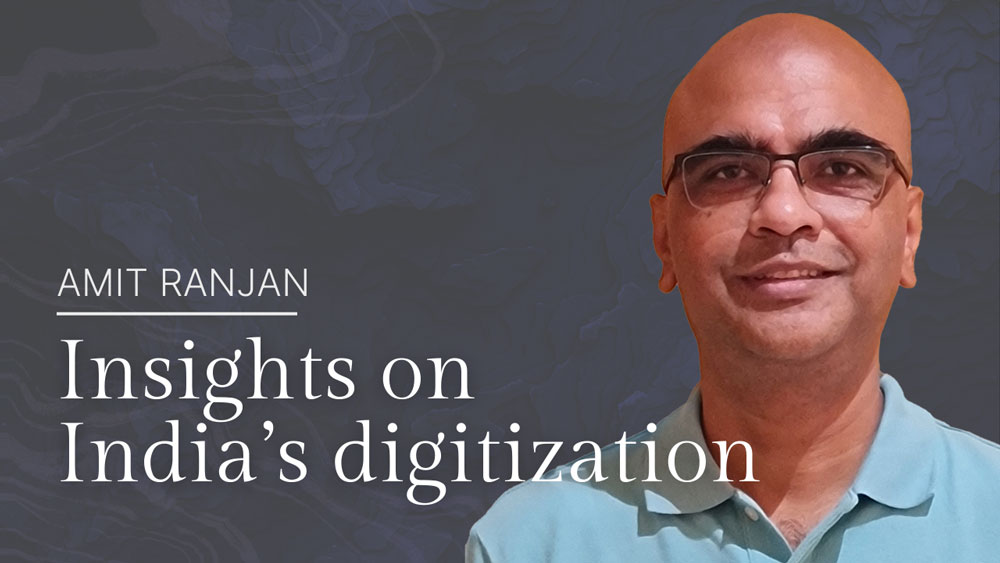Aiman Rathore
6
min read
From SlideShare to Indian IT Revolution
Amit Ranjan
Entrepreneur Previously: Co-founder @SlideShare, ex-Architect @DigiLocker (#IndiaStack), Govt of India
Key Takeaways
Amit Ranjan is a technology entrepreneur who co-founded Slide Share in 2006. The other two cofounders were based in San Francisco, California, while Amit hails from New Delhi, India.
Slide Share grew quickly and gained popularity, becoming the leading professional content-sharing platform on the internet at the time.
In 2012, Slide Share was acquired by LinkedIn, and Ranjan was crucial to this transition till 2015. After this, he moved on to work for the IT sector in the government of India.
Amit Ranjan is a thought leader and entrepreneur in the global IT scene. Hailing from New Delhi, India, he has collaborated with many IT leaders around the globe and even founded his own company with two other cofounders from San Francisco, California. Slide Share, an online slide-hosting service, is his brainchild that came out of necessity. It was ahead of its time and soon became the top player in the content-sharing space. Amit currently works within the IT sector of the Indian government, collaborating on massive projects such as Digi Locker. He also contributes his expertise to India Stack, the world's largest open API, while volunteering his time and insights to the Indian Software Product Industry Roundtable (iSPIRT).
Starting Up With Slide Share
Amit played a pivotal role in Slide Share's evolution from a small website to the leading professional content-sharing platform on the internet. The idea behind Slide Share stemmed from a need identified during a technology event in New Delhi in 2006, where there was no effective means of sharing presentation files. Recognizing this gap, Ranjan and his cofounders set out to create a platform that would give presentations and documents a social life online, preventing them from languishing on hard drives.
With just a small team working on Slide Share, it quickly gained traction, reaching approximately 150 million users across the globe by 2012. Establishing itself as the go-to content-sharing platform. It was a truly global platform, with 25% of users from North America, 25% of usage in Europe, 30% from South America and Africa, and 20% of users in Asia.
Slide Share's Acquisition by LinkedIn
In 2012, Slide Share was acquired by LinkedIn, which was also one of its technology partners. Ranjan was instrumental in the transition and continued to contribute to Slide Share until 2015 before moving on to work in the IT sector for the government of India. This acquisition marked a successful chapter in the startup's journey. Ranjan's vision and leadership helped smooth the transition and integrate Slide Share into the LinkedIn ecosystem.
Post-acquisition, there were inevitable changes as Slide Share moved from a 100-member startup to a large public company. Amit mentions that life inside a big tech organization is very different from startup culture, so the team dynamic naturally underwent significant transformations, which is the case with any Silicon Valley acquisitions. There was a shift in the management style, the team's culture, and the company's structure. On the other hand, there's also pressure on the big company to infuse a bit of startup culture for sustained growth and innovation.
However, Ranjan mentions that Slide Share eventually found its place within the LinkedIn ecosystem, becoming part of a broader vision for growth and development.
Indian Government's IT Sector and Digi Locker
Amit Ranjan was hired by the government of India to help grow the scale of their already existing digital identity program called Aadhaar. When Ranjan joined the team in 2015, the government wanted to build other digital platforms that used Aadhaar's application programming interface (API) capabilities. He was the perfect man for the job because he had previous experience in building large scalable platforms in addition to his entrepreneurial mindset.
Amit was hired as an IT architect at the Ministry of Electronics and IT, a department that deals with everything related to information technology in India. The government was planning to build a series of platforms, and Amit was assigned to one such platform called Digi Locker.
Digi Locker is a federated document network that holds many official documents, including IDs, certificates, documents, and other government-issued data records for citizens of India over their lifetime. So, instead of carrying physical documents, Digi Locker would enable citizens to hold digital copies of all their documents in one place, making it easier to manage and use. It's a massive project that started in 2015 and is still being implemented for India's enormous population of 1.4 billion. As of 2023, the platform has been adopted by over 200 million people, which is still less than 25% of the total population, so there's a long way to go before it is adopted by more rural parts of the country.
Volunteering with iSPIRT
The Indian Software Product Industry Round Table (iSPIRT) operates as a volunteer-driven initiative where industry leaders in the IT space come together to help further the cause of the Indian Software Product Industry. The organization serves as a platform for collaboration and innovation, aligning with the broader vision of positioning India as a hub for cutting-edge software products. The mission is to invest, focus, and encourage the software product industry in India to grow into a multi-billion dollar force to reckon with in the future. IT leaders in India offer this support to help grow the Indian economy in terms of employment, investments, and consumption.
"When you have such a large native indigenous domestic industry, which is building software for the world, at some point, that industry will reflect inward and say, "What can we do for the country?" So, India is fortunate in that sense that we do have a huge pool of software engineers, probably the second largest after the US. That led to tech innovations within India and the kind of collaboration you now see at iSpirit." — Amit Ranjan
Amit Ranjan is part of this high-level collaborative effort and believes it has impacted both the private and government sectors in catalyzing change within the Indian IT sector. iSPIRT is pivotal in cultivating an ecosystem for digital services and products within the country, focusing on products built for and by India. Ranjan believes there's a shift towards indigenous software development for domestic and global markets, thanks to iSPIRT's key role in this transformation. Ranjan offers his expertise to the organization, aiming to foster mentorship and share insights within the Indian Startup landscape to ensure its growth.
Switching from Startups to the Government Sector
According to Ranjan, governments are a different ball game. They're designed and built differently than the private sector or the more extreme version of the private sector, the startup space. The government reflects inward, acknowledging its capabilities and identifying gaps, though filling those gaps may take time and effort to overcome.
"It's very creditable that the Indian government has orchestrated a situation whereby the private side and the public side come together to build these large digital platforms." — Amit Ranjan
Ranjan observed a pivotal shift in India around 2008-2009 when the Indian government recognized these gaps and initiated a unique solution. They orchestrated a scenario wherein individuals from the private sector, including those from startups and large IT services companies, were encouraged to join the government in various engagement modes, creating a public-private partnership. Despite its bureaucratic nature, this loosely enmeshed system aimed towards a greater national cause, fostering collaboration for the greater good.
Ranjan compares his experience of working in the government's IT sector to working in a startup within the government—a government startup. While not the typical Silicon Valley startup, it captures the essence of innovation and agility within the bureaucratic framework. The success of this configuration in India demonstrates the government's ability to create a mechanism where the public and private sides collaborate seamlessly, contributing to the development of large digital platforms for the nation's benefit.
Advise for Young IT Leaders
Amit Ranjan's advice for those starting out in the IT industry, whether in India, the US, or globally, is to cultivate some essential qualities that he found valuable in his own journey. He emphasizes the importance of not harboring strong expectations and instead developing flexibility, agility, and a willingness to learn. He says working hard is important, but working smart takes you forward in the IT sector. Quick learning, self-learning, and adaptability are essential in the IT sector. These traits, acquired during his startup phase, proved beneficial even when transitioning to a vastly different environment like the government sector.
He advises aspiring IT professionals to approach their careers with an open mind, lower expectations, and have a proactive, action-oriented mindset. He believes this advice works outside of the IT sector as well. In a rapidly evolving world, the value of remaining adaptable and ready to learn in any professional setting will help you succeed in all professions and aspects of life.



